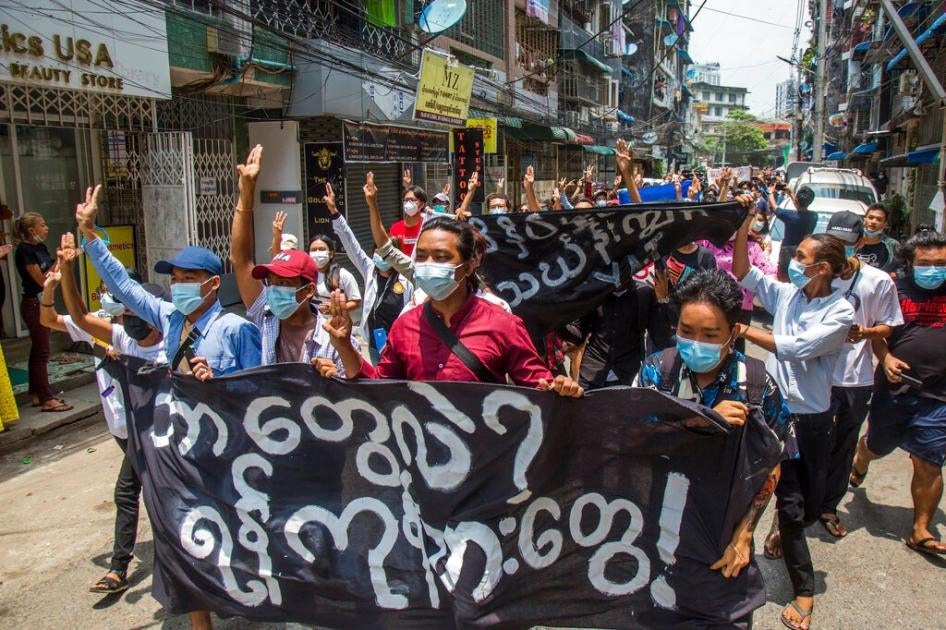(Bangkok) – Myanmar’s military junta should immediately stop threatening the Assistance Association for Political Prisoners (AAPP), a leading human rights monitoring group, Human Rights Watch said today. The group has documented security force abuses since the February 1, 2021 coup, including killings of protesters, arbitrary arrests and detentions, enforced disappearances, and unjust court convictions.
On April 26, the Home Affairs Ministry of the ruling State Administration Council (SAC) accused the AAPP of operating illegally because it was not registered as an organization. The junta’s announcement threatened “severe action” against the group for causing “State service personnel and public panic” that will “incite the occurrence of more riots” and “harm State stability, rule of law and restoration of law and order.”
“While the world’s media and diplomats regularly cite the AAPP’s daily updates on the military crackdown, Myanmar’s generals are desperately trying to silence the group to keep the truth from getting out,” said Phil Robertson, deputy Asia director at Human Rights Watch. “The threats are part of the junta’s shroud of silence and censorship, targeting frontline groups like AAPP, arresting journalists, and shutting down the internet.”
The junta’s efforts to target the AAPP are illustrated in the 115-page briefing paper, obtained by Human Rights Watch, that the junta leader, Sr. Gen. Min Aung Hlaing, presented to leaders at the ASEAN summit in Jakarta on April 24. Min Aung Hlaing claimed, without providing evidence, that the AAPP uses “data” that “appeared in fake and hoax news.” He added that the junta was “very upset” that “world media and international organizations restated” that information.
Responding to the allegations, AAPP Secretary-General Bo Kyi, a recipient of the Human Rights Watch Alison des Forges Defender Award in 2009, told The Irrawaddy magazine that: “I think it is just a political move as international governments, media and UN are referencing our data … The key issue is the violence they have committed, their killing and arrests. Instead of solving those problems, they are targeting a group like ours which is revealing the true events.” The AAPP told Human Rights Watch that the military’s threats have forced them to close their office in Yangon and compelled their staff to go into hiding and work from undisclosed locations.
The junta has also arbitrarily arrested journalists to prevent reporting on the opposition Civil Disobedience Movement’s broad-based resistance to the coup and the security force abuses. UNESCO reported that the junta has arrested at least 71 journalists since the coup. The AAPP says that 48 journalists are currently known to be in detention, most in undisclosed locations without access to their families or legal counsel. Many other journalists have fled to border regions controlled by ethnic groups, or to neighboring countries.
The junta has brought charges against numerous journalists and activists under revised penal code provisions adopted on February 14. The State Administration Council inserted a new provision, section 505A, that could be used to punish comments regarding the illegitimacy of the coup or the military government, among others. The new section would criminalize comments that “cause fear,” spread “false news, [or] agitates directly or indirectly a criminal offense against a Government employee.” Violation of the section is punishable with up to three years in prison. The law arbitrarily interferes with the exercise of rights protected under international law, including freedom of expression.
The junta has also increased pressure on independent media outlets by revoking their operating licenses. On March 8, the State Administration Council announced that it had cancelled the licenses of Mizzima, Myanmar Now, 7Day News, Democratic Voice of Burma (DVB), and Khit Thit Media. While these media groups have continued to report on events, they do so at great risk since journalists working for these outlets face immediate arrest if they are discovered doing their jobs as reporters.
“Groups like the AAPP and the independent media are playing a critical role holding Myanmar’s junta accountable, and they need to be able to continue their work,” Robertson said. “Governments concerned about the deteriorating human rights situation in Myanmar should be offering public support for these organizations and their brave staff members.”
|
News Release
Myanmar: End Threats Against Rights Group
Respect Rights to Freedom of Association, Expression
Your tax deductible gift can help stop human rights violations and save lives around the world.
Region / Country
Most Viewed
-
November 25, 2019
A Dirty Investment

-
May 12, 2025
The Gig Trap

-
September 30, 2024
“They Destroyed What Was Inside Us”

-
January 23, 2018
Hidden Chains

-
September 9, 2018
“Eradicating Ideological Viruses”




